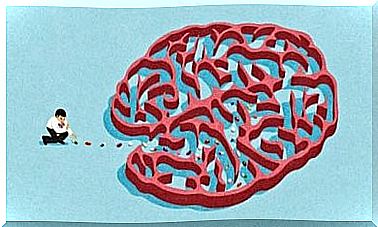Emotions Help Us Meet Our Needs

Everyone has different types of needs, as Maslow rightly explained through his pyramid. Some of our needs are simple, such as eating and protection, while others have to do with relationships, such as love and recognition. Emotions help us meet our needs as they help us survive so that we can understand the difference between a good and a bad situation. They also encourage us to relate and communicate with others.
They are like our inseparable friends we take with us on vacation. However, we can sometimes feel irritated by our own emotions, so we need to learn to deal with them properly in order to have a better internal coexistence.
We exist and communicate thanks to our emotions
Emotions help us meet our needs and are necessary for survival; One of the main functions is to prepare us physiologically for action. Many animals show a very effective emotional behavior, which means that there are certain emotions that help us to act immediately. This is perhaps the first way emotions help us meet our needs.
For example, if you feel scared by looking at a snake, your body will react even before you think about whether it is poisonous or not. In this case, the heart rate increases to send more blood to the muscles so that you can escape the possible danger. This way, if you need to get away from a situation quickly, you will act instead of wasting time thinking.

Your emotions tell others how you perceive and interpret internal and external stimuli. We generally communicate this in a non-verbal way. This type of communication is faster, more natural and more intuitive than verbal communication. This means that even if it is not your intention, your emotions will affect others.
Emotions help us and guide us because they give us valuable information about any situation. They can help you understand whether you like the situation you are in or not. That way, depending on how you feel, you will repeat the experience or avoid it. They are like an inner compass that helps us orient ourselves and know what is very important.
Emotions help us meet our needs
No emotions are either positive or negative. Some of them just turn out to be good (like happiness) and others, well, not so good (like sadness or anger). Every emotion has a purpose. They are all valid and necessary. They are your travel companions, they will follow you wherever you go and tell you what you need. Let’s look at some examples:
- Anger : We feel angry in unfair situations, perhaps moments when we feel that our rights are not being taken into account. We must set boundaries and protect ourselves.
- Sadness : We feel sad when we experience the loss of a person, an object, a job, etc.
- Fear : We experience fear when faced with a dangerous situation. We need to feel safe and secure.
- Happiness : Good experiences, winning something, succeeding at work or at school, are among many other things that make us feel joy. We will usually share this feeling with other people.
If you did not feel anger, would you protect yourself? If you were never sad, would you know how to deal with the loss of someone? How could you know that you were in danger if it were not for fear? Would you be able to know what makes you happy if it were not for joy? Your emotions are there for a reason – let them guide you!

4 strategies for regulating emotions
Although it’s okay for them to guide you, make sure they do it the right way. Do not let yourself be carried away by impulses, and also pay attention to your thoughts. You should not be overwhelmed by emotions without having your mind in order. Therefore, it is important to learn to handle them properly. The following four strategies will help you regulate them:
Identify
Being aware of the feelings you are feeling will surely help you deal with them. Knowing how to distinguish, for example, whether you are sad or angry, and distinguishing between specific situations or the thought that created this feeling, will allow you to act accordingly. In addition, being aware of our own emotions can help us identify them with others, making you more empathetic.
Tolerate
Despite the fact that there are emotions that we may consider negative, such as sadness and anger, it is important to learn to tolerate them instead of keeping them from your emotional repertoire. Emotions come and go, it’s a process. Being sad right now does not mean that you want to be sad forever or that you are a sad person. Try not to block or suppress your emotions; listen to them, feel them, and learn to deal with them.
Self-regulate
We are all capable of self-regulation. Do not let the feeling disappear with time, do something about it! Try your best to get negative thoughts to leave your thoughts and focus on the positive side of things. Distract yourself or do something you enjoy to reduce the intensity of your emotions. Work with yourself and learn to control impulses. This way you will take care of yourself while improving your well-being.
Express yourself and communicate
Aside from having your own resources, you should also express your feelings to those around you. Emotions must be shared. Trust others and let them know how you feel and what you need.

To sum up: emotions help us meet our needs and guide us to know how to act. They are incredibly valuable since we are able to survive and communicate with others. We first feel our emotions and decide what to do with them, and make ourselves responsible for our own actions. Let us be consistent with our feelings and thoughts so that we can express them confidently!









